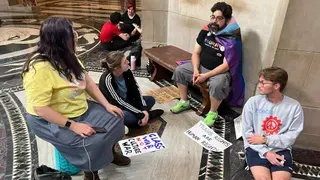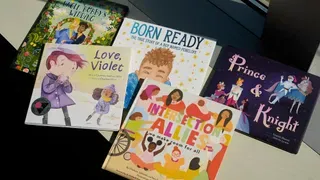November 23, 2011
Queers hope for more presence at Occupy SF
Kevin Mark Kline READ TIME: 6 MIN.
In less than two months, the Occupy Wall Street movement has grown from an initial protest in Manhattan to a global phenomenon encompassing more than 1,000 cities, and some participants and supporters locally see in its tactics a reflection of militant queer activism of the past.
"Occupy Wall Street grew out of frustration that a lot of people have been feeling for years," said Tommi Avicolli Mecca, 60, who helped found Queers for Economic Equality Now in late 2010 and has long been involved in various queer activist groups.
"The role queers can play is to question economic inequality," Avicolli Mecca continued. "The queer perspective is all about questioning the status quo. Not just with big banks and Wall Street and the White House, but right here and now, in our own communities."
Variously portrayed as an occupation, de-colonization, peaceful protest, unruly mob, public safety hazard, and place of sanctuary, Occupy Wall Street and its myriad offshoots have been the catalyst for a broad coalition of heterogeneous groups all seeking redress of grievances for a variety of reasons.
"We're just completely fed up and tired of being exploited," said Occupy San Francisco protester Jessica Hurrie, 29, who identifies as queer. Hurrie espouses "anarchist values," which she defined as "personal freedom and responsibility, food activism, and self-sovereignty."
Occupy San Francisco began on September 17 - the same day as the eponymous demonstration in New York's Wall Street district - with 10 protesters outside the Bank of America building at 555 California.
That humble protest morphed into a camp outside the Federal Reserve Building at 101 Market Street, which in turn grew into the bustling tent village that currently graces the south end of Justin Herman Plaza.
Avicolli Mecca, editor of Smash the Church, Smash the State!: The early years of Gay Liberation, asserted that mainstream LGBTs are perpetuating "the 1 percent" by buying into the very system of oppression that gay liberation fought against.
"Marriage has lured queers into the middle class, and the middle class teaches you to reject the lower class," he said. "That's why we have this indifference toward the epidemic of homelessness in our community by the gay middle class. When I came here in 1991 I rarely saw a homeless kid in the Castro. Look at them now."
The Occupy San Francisco encampment has grown into a microcosmic city-within-the-city. It now boasts a kitchen, medical tent, welcome table, learning center with library, safe spaces for children and families, portable toilets and sinks, garbage and recycling pickup, a whiteboard listing daily workshops and committee meetings - plus at least 100 tents.
The encampments in San Francisco and other cities haven't been without their problems. This week police closed down the Occupy Oakland camp at Frank Ogawa Plaza and police cleared the Occupy Wall Street camp in Zuccotti Park of protesters. Occupy members in both cities vowed to return. In San Francisco, police did a brief raid Wednesday morning, removing several tents that were along Market Street near the plaza. Members of Occupy SF were to meet with Mayor Ed Lee.
Faeries, hippies, and hobos
Many of the campers at Occupy San Francisco are chronically homeless. Reyna Raygoza, 23, who identifies as a transsexual woman, told the B.A.R. that she has been homeless for more than 10 years.
Raygoza expressed anger at some Occupy San Francisco organizers for attempting to distance the movement from the issue of homelessness. She also took issue with the common perception that shelters solve all the problems posed by living on the street.
"They're really homophobic and transphobic," Raygoza said of one shelter facility, St. Vincent de Paul s Multi-Service Center South at 525 Fifth Street. "They make me shower in the men's room when I go there. A friend of mine got kicked out of there, too, because he's gay, and they said he was being inappropriate with his friend."
The B.A.R. made multiple attempts to reach a facilities manager at the Multi-Service Center for comment, including a personal visit, but without success by press time.
At times Occupy San Francisco rhetoric can be reminiscent of the Flower Children from the Haight-Ashbury heyday. Gabriel "Garlique" Alfaro, 31, who identifies as a Radical Faerie, came to the camp from the angle of nature and environmentalism.
"There is an energy expansion happening that's connected to the evolution of all life, and we're a part of that, too," Alfaro told the B.A.R. "I've joined the Occupy SF camp in order to take part in dismantling the old system while helping to create the new one that will take its place."
Others have more pragmatic concerns, like ending the Federal Reserve and reforming "too big to fail" banks that invest money irresponsibly, and then require bailouts with public money.
Earlier this month, Occupy participants joined to support Bank Transfer Day, which encouraged consumers to take their money out of big banks and open accounts with local banks and credit unions instead, a move applauded by Avicolli Mecca.
"That's what we need to do. That really scared them, I think. Banks don't care if we occupy a plaza, but they'll notice if we pull our money out," he said.
In a very short time, the Occupy San Francisco camp has come to be regarded by its denizens and some of the general public as a makeshift civic institution.
Salon.com, headquartered in a nearby skyscraper, has extended free Wi-Fi coverage to the camp in a gesture of "virtual solidarity."
A public wedding recently took place in the camp. It was followed in short order by an all-day music festival and an Egyptian solidarity march that started from the camp.
On November 1, a woman who was stabbed in the Tenderloin took a taxi at 3 a.m. not to a hospital, but to the Occupy San Francisco medical tent. She was later transported to a hospital.
Cheers for queers
Local queer activist and promoter Christopher Ray, who has been very active with Occupy camps on both sides of the bay, stated without qualification, "OWS is the single most important movement in the history of history."
But Ray went on to lament what he considered a lack of queer presence in the protests thus far.
"There are only a handful of local queers, most of them Radical Faeries, who have made any sort of effort to really get involved," Ray told the B.A.R. "This is San Francisco, one of the most activist cities on earth, and it's time to start acting like it."
Zac Benfield, 34 and a self-identified "faggot," said queers don't need to join the Occupy San Francisco camp, or any camp, in order to participate in the nationwide civilian insurrection.
"We aren't one demonstration, we are 99 different demonstrations," argued Benfield, a co-founder of Feyboy, a South of Market-based queer arts and action collective. "That's not a weakness, it's a strength. Solidarity isn't uniformity. It's all of us doing our own thing in our own ways, but ultimately marching together under the same umbrella."
Tony Millan, a 25-year-old Fremont resident who identifies as queer, criticized Occupy San Francisco for lack of diversity, charging it with failing to recognize or welcome "women of color, indigenous people, biotrans women, queer-identified and gender-variant individuals," among others.
Millan is a supporter of Womyn of Color for Decolonization, which is leading the Occupy Riverside protest in southern California. The group marched in solidarity with Occupy Oakland after the October 25 police raid, in which Iraq war veteran Scott Olsen was seriously injured.
There are some signs that the shortage of queer activism discerned by Ray may be ending. Homonomixxx is another new radical, queer, feminist-influenced contingent arising out of the Occupy movement. Its very name links homo-ness to the economy.
"We formed in response to a lack of visibly queer, fierce, and fabulous activism in the early days of the demonstrations," explained Gilda Cage, 31, a trans woman and queer dyke. "Our mission is to bring well-studied fierceness, anti-oppression ethics, and keen artistic eyes to social justice activism."
To that end, Homonomixxx will host a dinner, dance party, and fundraiser on November 23 at a location to be announced. For details, visit www.homonomixxx.tumblr.com.







